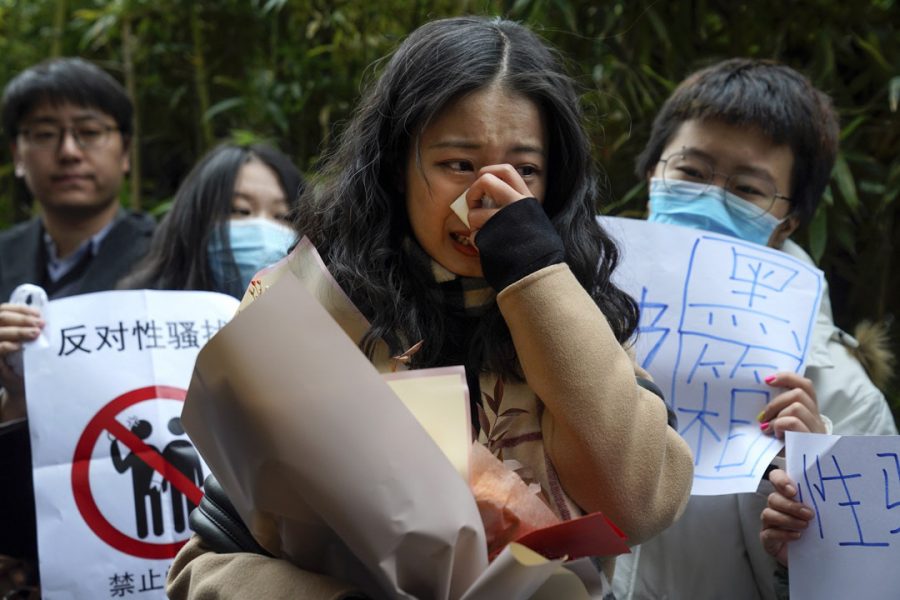High Profile Sexual Assault Case Reignites China’s #MeToo Movement
An intern brought a sexual harassment case against a prominent TV host to court in Beijing, China, on Dec 2, setting a potential milestone for the #MeToo movement in China.
Zhou Xiaoxuan’s accusation of Zhu Jun’s sexual harassment has finally been brought to court in Haidian People’s Court in Beijing after six years. Zhu Jun did not show up in court, and although both sides demanded an open court, the case, which went on for 10 hours, was held behind closed doors.
The result was the court was adjourned. Zhou asked for three judges to withdraw in fear they wouldn’t grant her a fair trial. The case will open again but sources are not sure when.
Zhou Xuanxian, better known by her nickname Xianzi, is a screenwriter in Beijing. She was 25 years old when the New York Times did a profile on her on Jan 7, 2019.
Zhu Jun, 56, was the co-host of the CCTV’s Chinese New Year gala program since 1997, and stopped hosting in 2018, the year in which Zhou sued him. CCTV is China Central Television, a Chinese state-controlled broadcaster. With the viewing rate of about 30% and watched by nearly every household in Northern provinces in China, the New Year gala program had made Zhu Jun famous.
Two years ago, on July 26, 2018, Zhou Xiaoxuan, posted a long article on the internet, alleging that Zhu Jun, a TV host officially recognized and well-known nationwide, had sexually harassed her four years prior, during her internship in CCTV.
She claimed that in 2014, Zhu Jun groped and kissed her forcibly in the dressing room. The following day, she reported to the police, but the case was not filed. In 2018, she sued again for a “dispute over the responsibility of damage in sexual harassment,” which became a cause of action in China.
Outside the court gathered around 100 people, according to the BBC in the article “China #MeToo: Court to hear landmark case of intern versus TV star.” It is a number hard to get in China right now, where assembly is not allowed during the pandemic.
There were also 2,500 people from five chat groups registering their support online.
According to the Washington Post in “In high-profile #MeToo case, an intern takes on a celebrity TV host in China,” one of the main slogans supporters held up signs was “Together, we demand an answer from history.” It is an answer to Zhou Xiaoxuan’s words, “I want to leave a question in history.”
[Editor’s note: the Post spelled Zhu Jun’s name incorrectly.]
From other photos taken outside the court, which are repeatedly taken down on Chinese social media, the supporters held up signs saying, “We want freedom that are not deprived,” “Xianzi, we on your side, waiting for an answer,” “Me Too,” “Faith in women,” “Break the Black Box” and “We are not walking genital organs.”
Among the gathering outside the court to support Xianzi were people arriving from all over the country, from students to middle-aged men.
According to the Beijing Normal University Children’s Sex Education’s report, there were local and foreign journalists present. One white reporter was asked by a police to take a photo of his press card, and to not use his tripod. Later, he forcibly surrounded by five or six police and taken to the local police station. On the way, the police attempted to take his equipment.
People followed to the police station, and yelling words like “stop pushing him,” “civilian clothes show your identity,” and “do not bother normal interviewing.”
As they were all prevented from entering the police station, one girl in a white coat stood in the lobby and cried in silence. She was also pushed outside among the words from the people shouting “stop pushing her.” The other girls that around were asked to provide their names and ID number. The police claimed it to be normal procedure, and that civilians had the duty to cooperate. The girls were afraid and tried to scribble or were shaking very hard. They were afraid that if they provided fake information, they would be arrested immediately, and if they gave true information, it would influence their academic career in school.
Xianzi appeared outside the court at about one in the afternoon, a slim figure with curly hair and a camel-colored coat. She received a poster from the crowd saying “must win” in black and white Chinese calligraphy. She said with agitated emotion, “Thanks to everyone for being present here … I’m so afraid of messing up.”
With encouragement from the crowd, she continued to say that “no matter we win or lose this case, it is a precious thing.”
“Even if the case does not win any legal meanings, it is able to make people aware of victims to sexual harassment like me. It is a victory itself,” she said.
She added, “We have to believe that although history will repeat itself, it will always move forward.” She bowed deeply among the clapping of the crowd.
Anita Hua, a junior from Shanghai, China, believed that this is a tragedy to Chinese society that this sexual assault occurred. She thinks that Xianzi is extremely brave in being able to speak up for herself. “I think revealing your wound is a very risky thing,” she said, “because as you are brave, you also have to face the memory you do not want to have by yourself.”
She thinks that other than the short-lasting fever from supporters on the internet, the victims of sexual harassment need a deeper level of support.
“When these women share their experiences, what they need the most might not be the general support of people on the internet, but real systemic support from other women,” she said. “We need more systemic support that can last longer,” she said. “But, of course, #MeToo movement in China, among other feminist movements around the globe, is still very new.”
She believes that it takes time for this kind of support to be established, and said, “I hope consciousness [of feminism] can be gradually popularized!”
Although the #MeToo movement started in 2006 and began to be influential in 2017, there has been less #MeToo progress in China than Western countries. According to Los Angeles Times, “Women’s and sexual minorities’ rights were among the few sensitive topics in China allowed a degree of public discussion — which could be quickly silenced if it led to political organizing.”
Chinese feminists were “interrogated about whether [they] were being funded by foreign forces” in 2015.
Likewise, on the internet, “the word ‘feminism’ has become a sensitive term on the tightly controlled Chinese internet, often accused of being linked with ‘hostile Western forces.’”
Mayphia Zhou, a freshman from Shenzhen, China, thinks that Xianzi’s incident is very touching. She did not know about Xianzi until someone reposted about her. “We rarely hear from the victims,” she said.
“She reminds me of Shiori Ito from Japan,” she added. Shiori Ito is a Japanese journalist and filmmaker, focusing on gender equality and human rights issues. She was a victim of sexual assault and became the face of Japanese #MeToo movement in 2017.
Mayphia said that the post she saw has already been taken down, and what remains are posts attempting to blur what the perpetrators did. “I reposted it but now it’s gone, it constantly happens,” she said. “All the headlines are trying to turn the attention on to the women and blur what the men did, although it was their fault.”
She said that most people on the internet who said negative things about Xianzi were men who could only think from their own point of view.
“For real, if you click into to homepage of those people who are abusing Xianzi, [you will find out that] they are mostly men,” she said. “They could only say and do what benefit themselves, which made them also the perpetrators.”
She used a Chinese idiom to describe this. “They do not care about Xianzi, but it is like the tale of the ghost of a person who was bitten to death by the tiger, only coming back as a ghost to help the tiger eat more people,” she said.
People on the internet tried to pick on the flaws of Xianzi and other victims, and Mayphia believed that people should not blame the victims because it was not them who committed crimes. “It was not Xianzi’s fault to be sexually assaulted,” she said. “She had done nothing wrong, but people just say that Xianzi cannot cope with stress very well and that’s why she’s making it such a big fuss.”
Mayphia dislike how people on the internet doubt the validity of cases of sexual assault and insult the women personally. “They [people on internet] comment about everything, their [the victim’s] face, their body, their education, everything.”
This event also made Mayphia think about a song inspired by the Nth room case in Korea and made her consider the burden women have to carry. “This makes me think about a performance of the song ‘Growing Up with a Burden of a Million Pounds,’” she said. “Who is making her carry the burden, why does she have to carry this burden?”
The “Nth Room” case is “a criminal case involving blackmail, cybersex trafficking, and the spread of sexually exploitative videos via the Telegram app between 2018 and 2020 in South Korea,” according to Wikipedia.
She felt like it was particularly brave for Xianzi to speak up. “If this was not Xianzi but another woman, this case might just end in silence like many other cases.”
She proceeds to talk about the other sexual assault cases in China. “Now there are so many cases where men kill their wives,” she said. “They always say that justice might arrive late but it would always be present. But women like Lhamo are already gone, and entries related to her on the internet is banned.”
Lhamo Dolma is a Tibetan woman living in Sichuna, and is a net influencer on Douyin, the Chinese version of TikTok. She mainly recorded her rural life. During a live streaming on Sept 14, her ex-husband poured gasoline on her, causing extensive burns and eventually death.
Mayphia pulled out a screenshot of a man mocking the supporters of a woman who alleged sexual assault, pointed out the inequality present in censoring.
“I easily found this in the headline, and Weibo did not censor it,” she said, “but for many entries related to Xianzi or Lhamo, when you search it on Weibo, it says that ‘due to related laws and policies, the tag is not displayed.’” Weibo is one of the biggest social media platforms in China.
Amy Ren, a junior from Jiangsu, China, thinks that Xianzi is very brave to endure this attention. “Because she waited for two years for the open of the court session, I think she’s really brave,” she said.
She thinks that although the topic of sexual harassment and assault are gaining more attention in China, there are still many victims who do not dare speak up. “The topic of sexual harassment is slowly raising people’s awareness in China,” she said. “However, there must be many girls and boys who are the victims but are afraid to speak.”
She believes that there should be more support in the society for them. “So, I think this society needs to be more tolerant,” she said, “giving the victims space and confidence to speak about their experiences.”
She said that as teenagers, we should support people around us and in the society.
“If there are friends around us who are experiencing similar things, we should encourage them to speak for themselves and find protection under laws. If there are not similar situation around us, we should pay more attention similar things in the society, and give the victims support and confidence.”
Charlotte Zeng, a freshman from Beijing, China, said that at first she was shocked after learning about this event because of the usual image of Zhu Jun. “When I first learned about the detailed process of this event, I was a little bit shocked like many others,” she said. “Could an ‘upright gentleman’ like Zhu Jun [commit] a crime?”
However, Charlotte strongly disagrees with the people who believes Xianzi was only doing bringing the lawsuit for attention. “If you only use your brain to think for a second, you will know that Xianzi is not trying to start a rumor but telling the truth,” she said.
Charlotte explained her support for Xianzi. “If all you want to do is get people’s attention or slander someone, would you spend two years or even more to go through the whole legal process, hire a lawyer, and go to court?”
Like Mayphia, Charlotte thinks people should not blame the victims. “Victim blaming is so prevalent,” she said. “So many people’s first reaction to news about sexual assault is not to hope that the law can punish the crimes, but to push all the faults on to the women.”
“They often say things like ‘there are so many women why the victim is only you’ and ‘your clothes are too exposing, that’s why you get harassed.’” Charlotte said that is something she often sees on social media.












